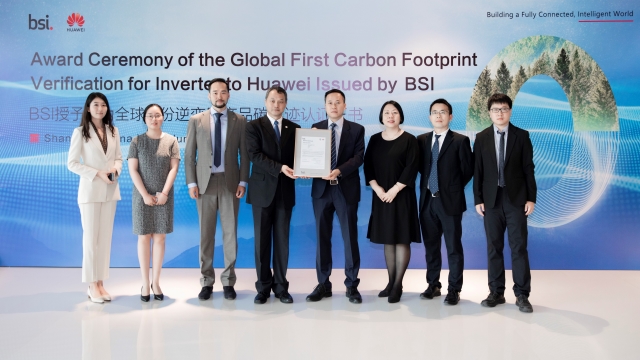PVTIME – On June 28, Huawei was awarded the world’s first Carbon Footprint Verification (CFV) for solar inverter products issued by the British Standards Institution (BSI).

A globally-renowned standards body, BSI is a special adviser to the United Nations Framework Convention on Climate Change and a producer of standards such as the world’s first carbon footprint standard PAS 2050. This CFV proves Huawei’s capability to evaluate the carbon footprint of products throughout their lifecycle and acknowledges Huawei’s efforts in reducing carbon emissions, increasing the share of renewable energy, and promoting circular economy. Huawei’s development concept — green, low-carbon, and sustainable — underpins the entire lifecycle of inverters and is accredited by BSI. It is of great significance to establish and develop a carbon footprint management system in the photovoltaic (PV) industry.
Driven by China’s goals of achieving carbon peak by 2030 and carbon neutrality by 2060, the PV industry, as a major contributor to renewable energy, is experiencing explosive growth. Although PV power generation is widely recognized as an important way to reduce carbon emissions, not all PV products themselves are low-carbon. According to the Clean Production of Solar PV in China report, PV plants cannot achieve zero carbon emissions for 1.3 years of the 25-year lifecycle. As such, reducing the carbon footprint is critical to the decarbonization of energy systems. To this end, it is important to understand and manage the carbon footprint as well as carbon emissions impact during the manufacturing of PV system components. In Europe and other parts of the world, carbon footprint is a mandatory option for device bidding. Only advanced green manufacturing enterprises with low carbon footprints can help customers develop low-carbon and high-quality PV projects.
Looking ahead, Huawei will continue to strengthen its low-carbon capabilities, use innovative technologies to develop more products with low carbon footprints, and accelerate carbon emission reduction for itself and its customers, moving towards a sustainable, greener, and better future together.











